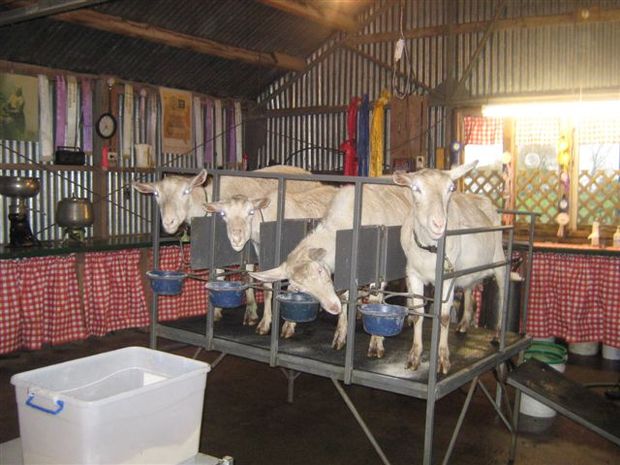
Artisan cheese makers in New Zealand toe a tough line. Aside from the vagaries of small business, the cost of complying with stringent regulations proves formidable for many producers. What do these regulations involve? And is artisan cheese making a viable venture in NZ?
According to Biddy Fraser Davies of Cwmglyn Cheese in Eketahuna who has a milking herd of four, the costs associated with producing cheese in her tiny one person cheese room beside the milking shed are the same as if she were producing 50 times as much cheese. When she started making cheese eleven years ago, she got a licence for $100 from the local council. Now her costs run to about at least 25% of her turnover. And although she and husband Colin don’t have a mortgage and receive a pension, they still find it difficult to make a profit.
John and Jeanne van Kuyk of Aroha Organic Goat Cheese in Te Aroha are also retired, and they have a small flock of Saanen and Anglo-Nubians goats. Their compliance costs are substantially higher as they also make unpasteurized cheese – the first company in New Zealand to be certified by MPI to make raw milk cheese for commercial purposes. They charge what it costs to make the cheese – approximately $5.45/100 grams for their pasteurized cheese and $12.25/100 grams – two and a quarter times as much. They must test the milk, the curd and the final cheese for every single batch. And they have three audits a year as well. But they don’t produce cheese for profit – they simply love the lifestyle.
Further north, Annie and Phil Armstrong run one of two milking buffalo herds in New Zealand: Whangaripo. They say testing all their cheeses is a huge expense and it eats into their profit margin. They make both hard and soft cheese and the soft cheese requires a greater degree of testing. They’d like to make raw cheese and get organic certification, but the expenditure is too daunting. Of the three producers, they all agree on one thing: they don’t think the regulations are too strict, and they want to keep their customers safe – they just think it costs too much for the size of their businesses.
We approached MPI for comment, but no one was available to speak to us. Instead they provided this written statement addressing some of our questions:
New Zealand prides itself as a producer of safe, high quality food – sold here and overseas. Milking animals and making cheese carry risks that need to be managed carefully in order for products to be safe for people to consume. Even one ‘bad batch’ that causes illness can have far-reaching consequences for other dairy operators’ reputations and for New Zealand’s reputation as a whole.
All food producers in New Zealand must produce food that is safe and suitable, however the requirements the Ministry for Primary Industries (MPI) sets to regulate this are risk-based and vary based on the type of food produced. Higher-risk food industries, such as dairy manufacturing, must meet stricter food safety requirements related to the likely hazards, processing complexity and the products produced, regardless of the size of the business.
All food for sale must meet the requirements of the Food Act. Farm dairies, where the milking takes place, must operate under a risk management programme (RMP) under the Animal Products Act, while cheese makers can opt to register under an RMP under the Animal Products Act or a food safety programme (FSP) under the Food Act – provided they are only selling the product in New Zealand and Australia. These management programmes outline the measures a business will take to ensure they are meeting their food safety requirements.
To save on costs, cheese makers can choose to register an RMP for both parts of their operation (ie farm dairy and cheese making). This means one verifier can check that the business is meeting their necessary food safety requirements during one visit, which means businesses are not paying for separate verification costs.
Both programme options take a risk-based approach to food safety and require the business to choose a verifier or auditor that has been approved by MPI to visit and check the programme is working effectively. There are a range of checks and balances in place to ensure any problems are detected and the food produced is safe.
This verification or audit is provided by organisations independent of MPI and the costs are set by these organisations.
MPI also recovers costs associated with providing services to each dairy processor, regardless of how much they produce. This covers important services such as the monitoring of dairy products to ensure consumer safety, systems performance monitoring and management, and the development and maintenance of New Zealand standards.
We are currently consulting on a range of proposals to update the way we recover costs from individuals and industries to provide essential food safety and biosecurity services.
None of these proposals are set in stone and all feedback will help us form good regulations.
We recognise that the level of charges has an impact on businesses and we have worked hard to keep costs down. At the same time, we cannot take short cuts on our food safety system because it provides for the safety of consumers and New Zealand's reputation as a producer of safe food - this consultation is an important part of getting that balance right.
Related Stories
World cheese authority Juliet Harbutt on NZ artisan cheeses
Biddy Fraser Davies on Country Life
Biddy Fraser Davies says audit costs will scupper her business

